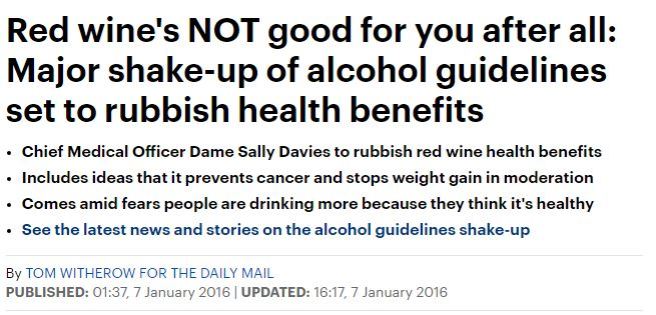Niamh was active in helping the media understand the implications of the 2016 new alcohol guidelines. In this blog post she discusses what happened as a result of the publication of the new guidelines and how the media portray the facts in their own way.
2016 new alcohol guidelines. In this blog post she discusses what happened as a result of the publication of the new guidelines and how the media portray the facts in their own way.
By Niamh Fitzgerald, Research Profile, @NiamhCreate
Journalists love a good alcohol story, especially at this time of year, and January 2016 gave them the ideal ammunition with the publication of new advice from the UK’s Chief Medical Officers (CMOs) designed to provide people with ‘accurate information and clear advice about alcohol and its health risks’. For the first time, the guidance advised that ‘no level of regular drinking can be considered completely safe’ and advised the same limit for both men and women – not to regularly drink above 14 units of alcohol (about 1 and a half bottles of wine) per week, at the same time moving away from the previous daily limits. The guidance was based on a lengthy process involving experts from around the UK including Prof. Gerard Hastings (from Stirling) and followed emerging evidence on the links between alcohol and cancer – kicking off a furore of media coverage.
Media coverage following the publication of the new guidelines
The Daily Mail led with the news that the guidelines would ‘put a stop to the belief that red wine is good for you in moderation’, while the Sun also focused on this ‘plonk lovers’ shock’ as the CMO’s ‘rubbished’ the supposed health benefits of wine.

Others focused on the cancer risk, with the Scotsman leading with ‘drinkers at risk of cancer from single glass of wine’; whereas the Telegraph headline was ‘health chiefs attacked for nanny state alcohol guidelines’. It was a frantic week for colleagues and I at the Institute for Social Marketing (ISM) as we sought to capture all of the newspaper, television and radio coverage for future analysis. As Lecturer in Alcohol Studies at ISM, and lead for teaching and public engagement on alcohol for the UK Centre for Tobacco and Alcohol Studies (UKCTAS), I was interviewed about the new guidelines on BBC News for their ‘Ask This’ feature, which takes questions from viewers. I also had a comment piece published in The Scotsman. Continue reading


